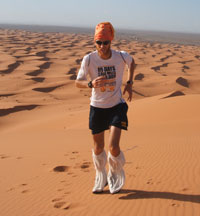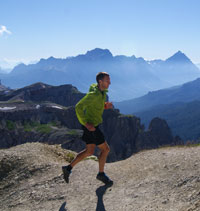A day in the life of... Dr Andrew Murray
Post date: 30/06/2017 | Time to read article: 3 minsThe information within this article was correct at the time of publishing. Last updated 18/05/2020
 Endurance athlete and GP Dr Andrew Murray reflects on working in Mongolia and why he decided to run from Scotland to the Sahara
Endurance athlete and GP Dr Andrew Murray reflects on working in Mongolia and why he decided to run from Scotland to the Sahara
The sense of space is unparalleled. The sun-baked desert plains of Mongolia are only broken by the towering mountains 50km distant to the West, and Asia’s highest sand dunes to the North East. They are interspersed with nomad villages and camels. I will always remember when I arrived in Mongolia; a young man gestured towards me, offering me what looked like cheese. My Mongolian and his English were limited but his smile drew me in. I remember thinking “what would it be like to live here?”
It turns out that Mongolia is an outstanding place to visit, but a more difficult place to live. It is the 19th largest country in the world, and the 146th most populated, giving it the lowest population density on Earth. Temperatures in the summer frequently top 45 degrees; whilst in the winter minus 30 Celsius is not unusual. There is little rain from one year to the next.
My new friend showed me round his house, a large circular tent or Ger, where he and eight other members of his family lived. I started to feel slightly ill. It was not the 44km leg I had run that day as part of “the Gobi Challenge”, but rather the realisation that this man that had so little was unfailingly generous, offering me a bed for the night, and food.
A fellow doctor, Duncan Goodall, and I decided to set up an impromptu clinic – true rural medicine with only two houses visible on the horizon. Even with a modest bank of patients, we saw an infected burn, ear infections, a small abscess, and were able to offer explanations via an interpreter for a healed fracture, and cataracts. The cataracts frustrated me.
I was in the Gobi desert to take part in a run, racing 250km across this region in six days. Fortunately, the race director Dave Scott is also the founder of the Yamaa Trust, whose sole aim is to ameliorate poverty in the Gobi desert, so I’d been able to offer a bit of medical input at camp each evening. Dave explained the unmet need of this population, and that with funding it would be simple and cheap to provide a life-changing cataract operation.
 Upon arriving back home after this amazing trip – a switch flicked. I’ll do a big run. I like deserts. I’ll run from Scotland to the Sahara desert, and raise money for the Yamaa Trust and come back to the Gobi.
Upon arriving back home after this amazing trip – a switch flicked. I’ll do a big run. I like deserts. I’ll run from Scotland to the Sahara desert, and raise money for the Yamaa Trust and come back to the Gobi.
Scotland2Sahara was worth it in so many ways. The human body has evolved perfectly over millions of years to cover big distances on foot, so I knew running 2,660 miles over the 11 weeks I had to complete the challenge was possible. There was a simplicity to it. Start at John O’Groats and put one foot in front of the other until you reach sand dunes and camels.
On the way I was passed at various times by a nine-year-old boy, by a donkey and had a few quite painful injuries – ilio-tibial band, Achilles tendinopathy, a hip flexor injury, and some fairly gnarly blisters. But the view coming over the High Atlas mountains with snow-capped peaks behind me and a green river of life dwindling down towards the Sahara was phenomenal.
I’ve since had the opportunity to compete in some incredible endurance challenges, and work in remarkable places. My doctor’s bag at the North Pole was very different to the one I’d use for house calls in Edinburgh. Vital supplies included an inhaler (many visitors become wheezy due to the cold dry air), some warm gloves to avoid frostbite, and a gun to fire in the air should a polar bear fancy some ginger, Scottish dinner. Mongolia is still my favourite, and the opportunity to go back and share a visit with my wife Jennie offered a chance to see the sights and contribute medically.
The Yamaa Trust have now funded a number of cataract operations in the south Gobi, and this region opened my eyes. Despite its faults, we are a part of an NHS that offers a phenomenal service to the people of Great Britain. The paperwork drives me mad, but why is it that 99% of customers are satisfied, but 95% of press attention is negative? It also showed me that qualifying as a GP is a unique ticket to work in some amazing places, and gives us life skills that can make a difference in the UK and further afield.
For more information follow him on Twitter at @docandrewmurray or visit his website.


